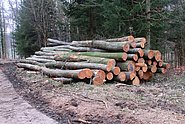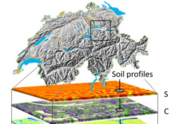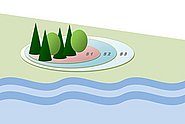
Soil and cycles ¶
Forests can only provide ecosystem services like clean water, pure air and nutrients for plants when the soil is healthy. We examine how external factors like pollutants, climate change and land management affect the functions and biogeochemical cycles in the soils of near-natural ecosystems.
Content ¶
Soils fulfill various functions, including provision of water and nutrients for plant growth (“production function”), habitat for numerous organisms (“habitat function”) and regulation of water, carbon and nutrient fluxes (“regulation function”). These functions are important factors for the provision of ecosystem services, including wood and energy production, carbon sequestration, flood protection and provision of drinking water.
External influences such as pollution, rising temperatures and human interventions alter the water and nutrient cycle and therefore the growth conditions for roots and microorganisms in the soil. The composition of the soil community also changes as a result. Managing woods using heavy forestry machinery, for example, consequently has an impact on soil fertility.
We investigate these interactions through field and laboratory experiments and long-term monitoring projects. With the findings, we are able to draw conclusions on the living conditions encountered by trees, their roots and soil organisms – both now and in the future – in forest soils and other uncultivated soils as well as the networks in which they are linked.
Related topics ¶
Contact ¶
WSL publications ¶
Scientific publications ¶
Allgaier Leuch B., Braun S., Meusburger K., Tresch S., Reinhardt M., Waldner P., Wolf O. (2025) Acqua potabile. In A. Strauss & C. Fischer (Eds.), Rapporto forestale 2025. Evoluzione, stato e utilizzazione del bosco svizzero. Berna; Birmensdorf: Ufficio federale dell'ambiente (UFAM); Istituto federale di ricerca per la foresta, la neve e il paesaggio (WSL). 102-103. Institutional Repository DORA
Allgaier Leuch B., Braun S., Meusburger K., Tresch S., Reinhardt M., Waldner P., Wolf O. (2025) Drinking water. In A. Strauss & C. Fischer (Eds.), Forest Report 2025. Development, condition and use of Swiss forests. Bern; Birmensdorf: Federal Office for the Environment FOEN; Swiss Federal Institute for Forest, Snow and Landscape Research WSL. 102-103. Institutional Repository DORA
Allgaier Leuch B., Braun S., Meusburger K., Tresch S., Reinhardt M., Waldner P., Wolf O. (2025) Eau potable. In A. Strauss & C. Fischer (Eds.), Rapport forestier 2025. Évolution, état et utilisation de la forêt suisse. Berne; Birmensdorf: Office fédéral de l'environnement OFEV; Institut fédéral de recherches sur la forêt, la neige et le paysage WSL. 102-103. Institutional Repository DORA
Allgaier Leuch B., Braun S., Meusburger K., Tresch S., Reinhardt M., Waldner P., Wolf O. (2025) Trinkwasser. In A. Strauss & C. Fischer (Eds.), Waldbericht 2025. Entwicklung, Zustand und Nutzung des Schweizer Waldes. Bern; Birmensdorf: Bundesamt für Umwelt BAFU; Eidg. Forschungsanstalt für Wald Schnee und Landschaft WSL. 102-103. Institutional Repository DORA
Angove C., Wiesenberg G.L.B., Lehmann M.M., Saurer M., Tang Y., Sahlstedt E., … Rinne‐Garmston K.T. (2025) Time‐integrated δ2H in n‐alkanes and carbohydrates from boreal needles reveal intra‐annual physiological and environmental signals. New Phytol. 246(2), 498-514. doi:10.1111/nph.20448 Institutional Repository DORA









